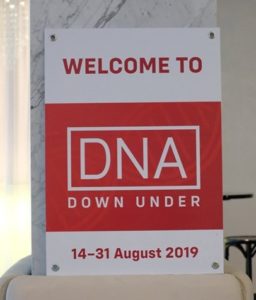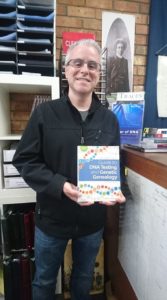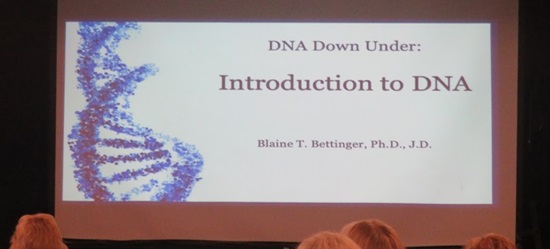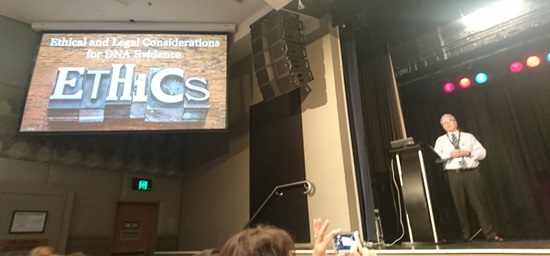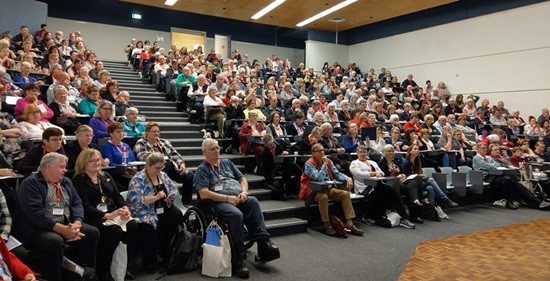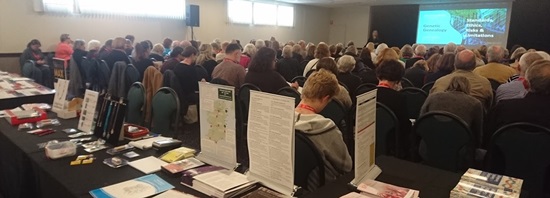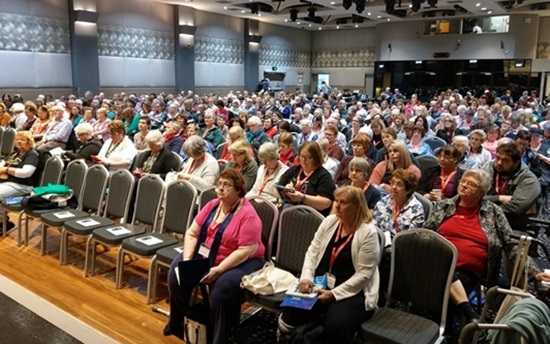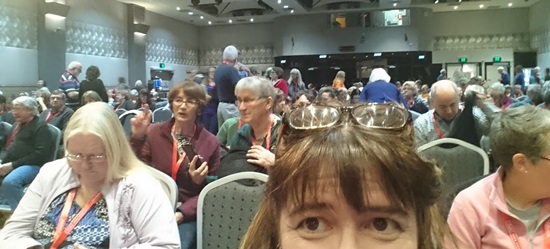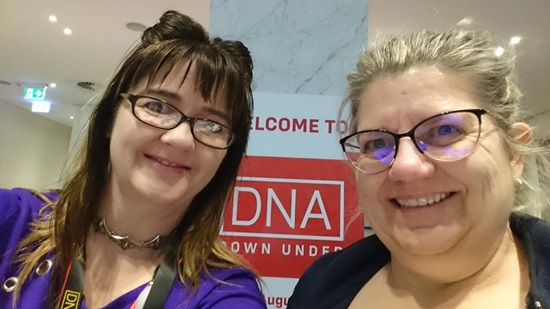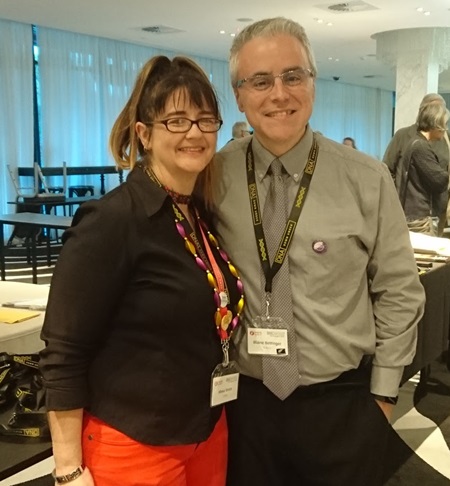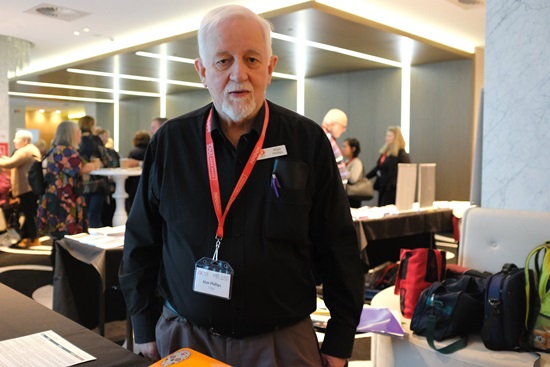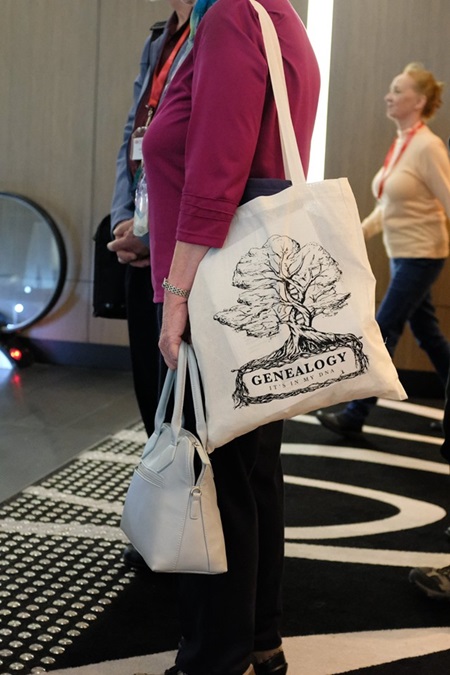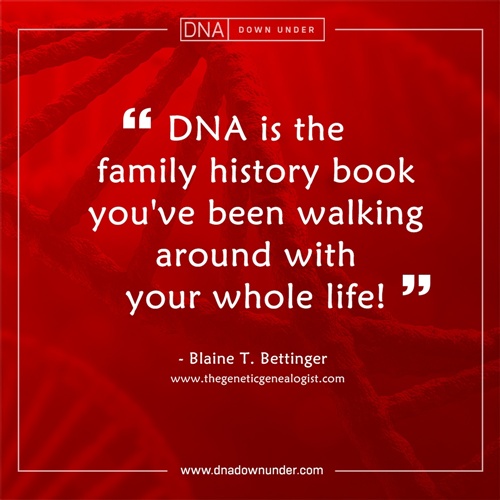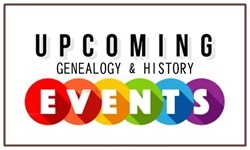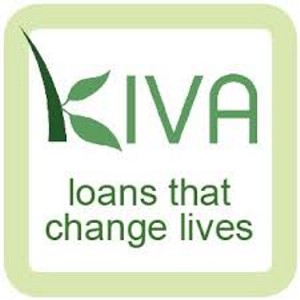7 Traits that Make a Good Genealogist
If you don’t like the idea of wandering a cemetery for hours, or spending a day in the archives, or if you hate the smell of old books … let me tell you that family history just isn’t for you. So can I suggest you take up photography, hiking, woodwork, scapbooking or knitting instead.
However for those that think the above is a perfect day out … welcome to “the tribe”. You are a fellow totally obsessed genealogist, and there’s nothing wrong with that. Nothing at all. We feel at ease with fellow genies, as they are part of our ‘tribe’. They ‘get’ us, and don’t eyeroll like the other family members. But what brings us together is our similarity in certain traits. Here’s just a collection of 7 main ones.
HAVE PATIENCE – Sitting in a library or archive and scrolling through microfiche, or paging through old record books is not for everyone. But a good researcher will know that you might be there for a day or two (or more), before your find who you’re looking for. That one person you’ve been hunting for years. And some days you don’t find them at all. Family history IS NOT a quick hobby. I know many people who have been been researching for 20, 30, 40 or more years. You may spend days, weeks or years looking for one person … and of course frustration sets in, but when you find them you’re on cloud 9 for a year!! Your patience finally paid off.
GET ORGANISED – This is a great trait to have, but it’s not one that comes naturally to many of us. When you start researching you will experience what is known as the “paperwork snowball”. Paperwork is everywhere, notes, documents, printouts, photos and more … and it seems to breed. But having all this useful information and tidbits is only useful if the relevant information is findable and retrievable quickly. In saying that, I know many, many people who have ‘the pile’. This is one that usually on the office floor and has paperwork stacked as high as the desk. It’s great that it is sort of in one place, but you have to agree it really isn’t retrievable. So why not make an hour each week to work on ‘the pile’, and you might be surprised at how quickly it goes down, not to mention what you might find in the pile that you’d forgotten about. And of course then there’s the digital filing too (emails, scans, photos, downloads … ).
QUESTION EVERYTHING – Be a detective and question everything. A good practice is not to accept a piece of evidence until you have it verified from 2-3 different sources. Names, dates, places … query everything. The how, the why, there where. The more you question and look for more sources to verify what you have, the better researcher you’ll be. Also look for the original records, not just at the indexes.
HAVE DETERMINATION – This could also be labelled as persistence or stubborness is what it comes down to. When we are after that clue that piece something together, we are stubborn, and keep researching. As per point 1, patience is also needed here, but ultimately you’ll find your answer if you stick with it.
SELF-EDUCATION – This one is really important, but probably not one that gets the credit it deserves. This can include going to seminars or conferences, watching YouTube videos (genealogy related ones!) or webinars, listening to any number of the genealogy podcasts, doing an online (or offline) genealogy course, or simply reading. Read books, read blogs, read genie mags … it is a great way to learn, and help yourself get self-educated. In essence the more you learn, the better researcher you’ll be.
BE POLITE – I shouldn’t have to mention this one, but I know I do. Be polite and courteous in your dealings with people online as well as those offline. Others do want to help you, but they won’t if you’re rude and demanding.
BE ETHICAL – When you get into family history, without a doubt you will find out some family secrets, many of which other family members don’t know. While it’s good to record these in your private tree, you shouldn’t broadcast these details to the world, as in many cases it can have huge ramifications, and it’s not your job to blurt it out. So ethics are required, and you just need to tread carefully.
I think of my fellow genie friends near and far, and I recognise so many of the above traits in them, as well as myself. So if you wanting to be a better genealogist, practice the above and I guarantee you will improve your research. I know there are more, and feel free to add your suggestions as a comment below.
It’s OK to Take a Break!
I’ve been blogging for a number of years now, and I’ve not been one to ever ‘set a schedule’ for posts, but rather I just tend to blog when the mood and time allows.
In saying that, I do follow a number of bloggers who do post regularly (ie. every day, or every week), and while I envy them for having the time to do so, it’s just not for me.
For those who’ve followed me for a while, yes, I have been very quiet for the past few months as it’s been chaotic to say the least, and during that time blogging was something that pretty much dropped off the radar for sanity reasons. However, hopefully life is getting back to some form of normality, and that includes getting back to blogging.
I know of other bloggers who have had blogging breaks for various reasons, and don’t beat yourself up about it, it is OK to have a break.
Life does take over, or sometimes the enthusiasm isn’t there, or the time to even do family history. So just like a holiday, take a break. Take some time to chill, recharge, and come back when you’re ready.
DNA Down Under … an Event Like No Other!!
August has been a big month for me. As part of the organising team for Unlock the Past’s DNA Down Under roadshow, myself along with the others have been busy with the preparation and attending these events.
DNA Down Under truly was an event like no other in Australia. For a start it was an event that went to 6 Australian cities, 5 of which were full one-day events (Brisbane, Perth, Adelaide, Canberra and Melboourne), and Sydney which was a non-stop 3-day event. It was also the first ‘DNA only’ genealogy conference to be held, and from the reaction, attendace, and comments – this is just what Australia needed. It catered to everyone from the “I haven’t even tested yet, what will DNA show me?” through to the very advanced genetic genealogy topics.
I made it to three venues: Brisbane, Adelaide and Sydney – so I know it all, right? Ha … I’ll admit I didn’t get to a whole lot of talks even over the three venues, which is the downside of being an organiser and exhibitor. Still I did manage to get to some.
Anyway there’s no doubt about it, there was a vibe to DNA Down Under that I haven’t noticed with other Australian conferences apart from the last Congress. People were so excited, they were counting down the days – and I don’t believe that they were disappointed.
UNDERSTANDING THE BASICS
Blaine Bettinger (aka The Genetic Genealogist), speaker, author, Facebook group convenor, DNA guru, and all round great guy – Blaine has an incredible knack to be able to teach everyone in a room the basics of DNA without losing them with scientific jargon. Not an easy task. There’s no doubt that DNA is a big topic, and I have sat through numerous DNA talks before, and I have seen many walk out at the end more confused. However these talks, not so. People were so excited because they now ‘get it’, and were so eager to learn more.
A quote I noted from the Blaine’s “Introduction to DNA” talk was “use DNA to confirm or support your research”. In otherwords DNA is not a replacement for traditional research, merely an added tool you can utilise, and a powerful one at that. He said that if a major new record set was to suddenly be discovered, genies would go crazy using it to add and verify their current data. That’s how you should think of DNA testing.
MORE TOPICS
Blaine was just one of a fantastic group of presenters who taught people about the various aspects of DNA and genetic genealogy including: the myths of DNA testing, how to interpret your results, how to use GEDmatch and DNA Painter, finding matches, using DNA to solve old family mysteries, as well and genetic genealogy standards and ethics and more! There was even a few special talks in different states: Perth was lucky enough to have the Producer of ‘Every Family Has a Secret’ show talk about that, while Sydney had talks from the Police Forensic Department, along with other talks on adoption, genomics and more!
THE ETHICS
Apart from everyone being able to understand the basics of genetic genealogy and DNA testing, one other thing that struck me were the ethics talks. The topic wasn’t new to me as I’ve heard the amazing Judy G. Russell talk on the topic, but I think it was an eye-opener to so many, with so many facets to consider.
– we need to inform testers of the risks BEFORE they test
– we should get consent from testers in writing
– we cannot transfer data to a different site without their consent (ie. take an Ancestry DNA test, but then also upload those results to GEDmatch and/or MyHeritage DNA)
– if you are managing a test for someone, before testing ask if they want to know about any ‘surprises’ or ‘unexpected results’ if they show up
– respect the wishes of those who don’t wish to test
– respect the privacy of those who have tested (ie. don’t share their results with others)
and a whole heap more!!
Louise Coakley spoke on the topic at most of states, while Blaine covered it in Sydney. Thanks to both of them, many have gone away much wiser and now understand the potentional ethical and legal ramifications of what DNA testing can mean.
THE PANEL DISCUSSIONS
The last talk of both Day 2 and Day 3 in Sydney were panel discussion. The first was on DNA Ethics and again this brought up lots of interesting (and thought provoking) questions (and answers) from the panelists.
The second panel discussion was on DNA: A Look at the Future … again very interesting, and as someone said, it’d be interesting to have that recorded and play it back in 1-2 years time, and see what has and hasn’t happened in the ever-changing DNA world.
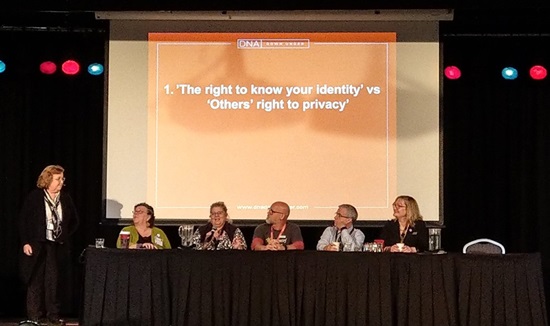
the panel L-R: Michelle Patient, Helen Smith, Brad Argent, Blaine Bettinger and Louise Coakley. Chaired by Kerry Farmer.
THE CONNECTIONS
One of the best parts of a genealogy conference is meeting friends – old and new. This happened to some degree at the one-day events. After an intese day of learning, some stayed and had dinner together, but it happened a lot more in Sydney with three days for people to catch up! And of course there was the geneablogger photo is Sydney.
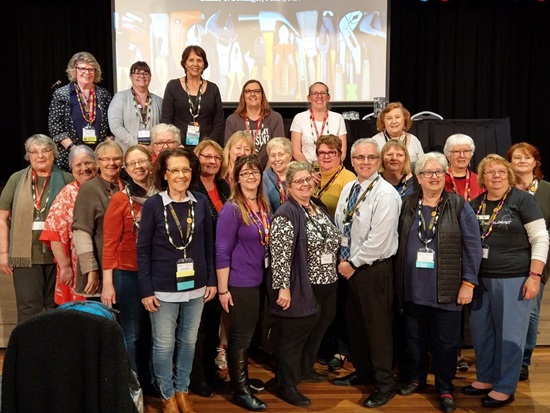
Official geneablogger photo, DNA Down Under Sydney
Back Row L-R: Susie Zada, Janelle Collins, Fran Kitto, Melanie Dunstan, Chez Leggatt, Kerry Farmer
Middle Row L-R: Patsy Daly, Sue Wyatt, Heather Clarey, Shelley Crawford, Pauleen Cass, Veronica Williams, Fiona Tellesson, Margaret Moxon, Jennie Fairs, Shauna Hicks, Judy Lofthouse, Maggie Gaffney
Front Row L-R: Sharn White, Alona Tester, Helen Smith, Blaine Bettinger, Jill Ball, Lilian Magill
Other geneabloggers at DNA Down Under Sydney, but who missed the photo: Maureen Trotter, Michelle Patient, Jan Gow, Louise Coakley, Diane Smith, Jenny Joyce
THE WRAP-UP
You know you’ve been to a good conference when everyone leaves absolutely exhausted, but also so disappointed that it’s over. There’s no doubt that was so many of us at DNA Down Under – particualarly after Sydney. But you also know it’s been a conference when people are asking when’s the next one. To that one I say … maybe 2021 … so stay tuned!!
There’s so much more I can say about the conference, but plenty of other bloggers have written as well, so take a moment to read those if you get a chance. But here’s just a few photos from the conference.
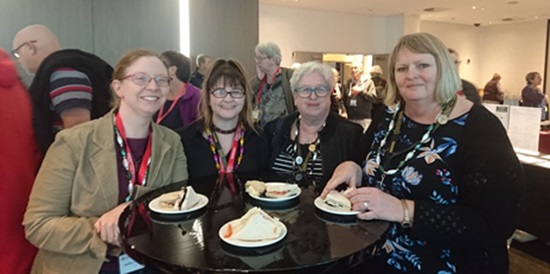
awsome to catch up with these lovely ladies
L-R: Shelley Crawford, little ol me, Jill Ball and Shauna Hicks
Genetic Genealogy Tips & Techniques Facebook Group – click here
The Family Tree Guide to DNA Testing and Genetic Genealogy – click here
Shared Centimorgan tool – click here
International Society of Genetic Genealogy (ISOGG) – click here
Counting Down to DNA!
I know I’ve been rather quiet on the blogging front for a while now, but for a good reason.
As part of the organising team behind the DNA Down Under roadshow, that has taken up a lot of time (day and evening). But the beginning of the event is almost here, so my organising part is almost done.
Starting next week, Australia is having it’s biggest ever DNA specific genealogy conference. Held over 2 1/2 weeks, this roadshow features the guru of everything genealogy DNA, Blaine Bettinger, also known as “The Genetic Genealogist“. While he is the keynote speaker, he is joined by a whole host of Australia’s top genetic genealogists such as Louise Coakley, Helen Smith, Michelle Patient, Kerry Farmer and a stack more!!
It’s truly the ultimate DNA fest … and it’s for total beginners through to advanced level, so there’s something for everyone.
I saw a comment on Facebook saying “where else can you get 8 hours of DNA learning from the so many of the best in the world at one event!”, and another comment saying this is her “once in a lifetime event”. It’s so exciting to hear that others are just as excited.
The roadshow kicks off in Brisbane on Wednesday 14 August, and heads around the country to Perth, Adelaide, Melbourne, Canberra and finishes in Sydney with 3-day in-depth conference.
To give you an idea of what you’re in for (excluding Sydney), here’s some of talk titles:
– Introduction to DNA
– Using Autosomal DNA for 18th & 19th century mysteries
– Genetic genealogy: standards, ethics, risks, limitations
– Using GEDmatch & DNA Painter to analyse your DNA
– Myth Busting Ancestry
– Finding Australian matches
– Limitations of cousin matching
– Getting the most from your FTDNA results
– Getting the most from your MyHeritage results
In Sydney there’s 10 speakers over 3 days, with over 40 talks, so there’s too many to list, but check the program here. But in general thre’s everything from beginners, to ethics, to adoption, to ethnicity, to GEDmatch, to visual phasing, to DNA research plans, to a project using DNA to identify soldiers, as well as how to get the most out of your results with the different DNA companies, and a whole heap more.
So if you’ve not taken a test yet, but have been considering it come along and see how DNA can help with your research. Find out about the different DNA testing companies, as well as the different types of tests.
If you have taken a test but are at the “What now?” stage, come along and find out just that. What you can do with those results. How you interpret them. How you can find and contact matches. [This is totally where I’m at. I’ve done 3 different tests and just haven’t taken to time to do anything with them, so I’m expecting to be mindblown by what DNA can actually tell me once I understand it.]
And for those who have already done those steps, find out about a number of third party tools that can help you take your results even further.
The DNA Down Under roadshow runs from 14-31 August, so be sure to check the website for details of where and when for each city, along with the speakers and program.
Pre-bookings for tickets at Brisbane and Perth have closed, but tickets are still available at the door. The other states have a few more days to pre-book. And in case the event wasn’t incentive enough, everyone who pre-books automatically goes into the draw for over $17,000 in prizes!! You can see the full listing of prizes here.
So come along and learn a heap about genealogy and DNA, and meet and make new friends who love family history as much as you do. And if you’re heading to DNA Down Under in Brisbane, Adelaide or Sydney, please come up to the Gould Genealogy/Unlock the Past stand and say a big hello to me.

